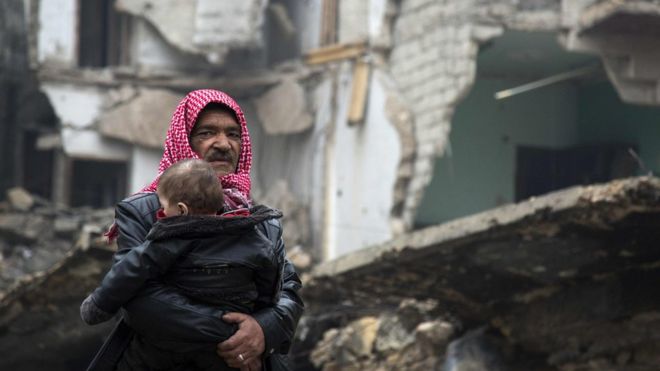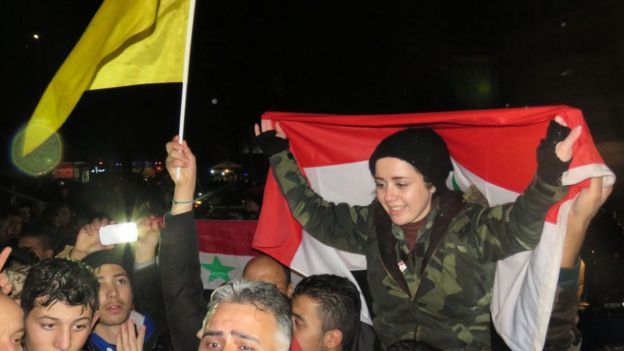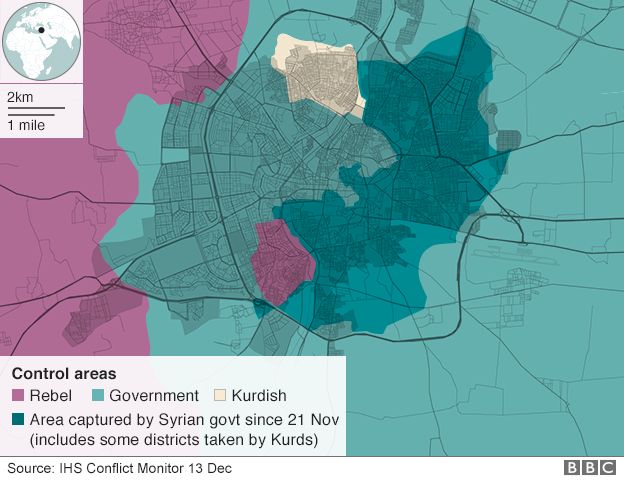- Dec 13, 2016 18H:57 GMT/UTC/ZULU TIME
- Middle East
 AFP
AFP
A deal has been agreed for Syrian rebel fighters to leave enclaves they still hold in eastern Aleppo, Russia's ambassador to the UN has said.
It is not clear whether the deal applies to civilians, thousands of whom are trapped in the besieged areas.
The rebels are on the brink of defeat in the city after a major government offensive backed by Russian air power.
Word of the deal came as the UN reported summary killings by pro-government forces.
The UN's human rights office said it had reliable evidence that in four areas 82 civilians were killed, adding that many more may have died.
Russian ambassador Vitaly Churkin said he understood that an arrangement for rebel fighters to leave the city could happen "within hours", but that civilians were not included.
"The agreement is for the fighters to leave," he said.
"The civilians, they can stay, they can go to safe places, they can take advantage of the humanitarian arrangements that are on the ground. Nobody is going to harm the civilians."
Rebel groups have confirmed the deal, but suggested that civilians will be included.
Extraordinary turnaround: By BBC defence and diplomatic correspondent Jonathan Marcus
 AFP
AFP
The seizure of the eastern part of the city by government forces and the crushing of the rebel enclave there represents a major propaganda victory for the government of President Bashar al-Assad, which now controls virtually all of the major population centres of the country.
Aleppo though - the most populous city before the civil war and the country's financial centre - is the biggest prize.
The capture of Aleppo represents a victory not just for Mr Assad but also for his Iranian and Russian backers.
Aleppo itself may not matter much on Moscow's strategic chess-board. But the defeat of the rebel opposition there underscores the extraordinary turn-around in President Assad's fortunes.
Before Russia intervened President Assad was on the ropes, his military power crumbling.
External actors have propped up his government in large part to secure their own strategic aspirations. And these aspirations will play an important part in deciding what comes next.
What is the situation in the rebel areas?
Russia's military says 98% of the city is now back in government hands.
The rebels have control of just a handful of neighbourhoods, believed to include Sukkari and Mashhad.
It is hard to know exactly how many people are in the besieged areas, although one US official with knowledge of efforts to secure safe passage for people in the city told the BBC that there were around 50,000 people.
Other local sources say there could be as many as 100,000, with people arriving from areas recently taken by the government.
Unicef quoted a doctor in the city as saying: "Many children, possibly more than 100, unaccompanied or separated from their families, are trapped in a building, under heavy attack in east Aleppo".
Ibrahim abu-Laith, a spokesman for the White Helmets volunteer rescue group, said 90% of their equipment was out of operation and only one medical point was still working in the besieged areas. There was no first aid equipment left, he added.
He said volunteers were using their hands to pull people out of rubble, but some 70 people were stuck and could not be extracted.
Last messages from Aleppo
Activist Lina Shamy: "Humans all over the world, don't sleep! You can do something, protest now! Stop the genocide".
Bana Alabed, aged 7: "I am talking to the world now live from East #Aleppo. This is my last moment to either live or die."
White Helmets tweet: "All streets & destroyed buildings are full with dead bodies. It's hell."
Abdul Kafi Alhamado, teacher: "Some people are under the rubble, no-one can help them. They just leave them under the rubble until they die - these houses as their graves."
What has happened in districts seized by the government?
UN human rights office spokesman Rupert Colville said that 82 civilians had reportedly been killed by pro-government forces, of whom 11 were women and 13 children, adding that the death toll could be much higher.
Mr Colville added that there were reports of numerous bodies in the streets, with residents unable to retrieve them for fear of being shot on sight.
The UN's humanitarian adviser on Syria, Jan Egeland, earlier spoke of "massacres of unarmed civilians, of young men, of women, children, health workers", saying a pro-government Iraqi Shia militia was responsible for the killings.
What is the international community saying?
The UN Security Council is currently holding an emergency meeting to discuss the crisis in Aleppo.
US ambassador Samantha Power told the meeting that the Syrian government and its allies Russia and Iran bore responsibility for killings of civilians.

For the UK, Matthew Ryecroft said the UN had failed in its mission to resolve the crisis, and the reports of atrocities "evoked the darkest days of the history of the United Nations".
Russian ambassador Churkin denied humanitarian abuses were taking place. Earlier Kremlin spokesman Dmitry Peskov said atrocities were being carried out by "terrorist groups", referring to rebels.
How did Aleppo reach this point?
For much of the past four years, Aleppo has been divided roughly in two, with the government controlling the western half and rebels the east.
Syrian troops finally broke the deadlock with the help of Iranian-backed militias and Russian air strikes, reinstating a siege on the east in early September and launching an all-out assault weeks later.
- What's happening in Aleppo?
- Life in Aleppo: 'We are crying and afraid'
- Profile: Aleppo, Syria's second city
- Islamic State and the crisis in Iraq and Syria in maps
- Syria rebels set up camp for IS defectors
- How Moscow’s Syria campaign has paid off for Putin
- Why are Aleppo's children so badly affected?

No comments:
Post a Comment